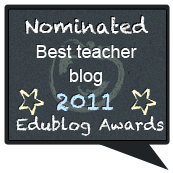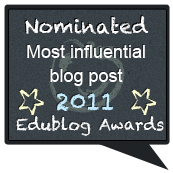Inspired by the wonderful ideas offered by Ms. Flecha as well as the thoughts culled from interactions with my colleagues, today I launched an exciting new vocabulary enrichment program in my classroom.
It started after school yesterday when I did some nifty reorganization that opened the front of the room more, reduced the amount of clutter in front of my desk, and afforded me space to institute the new charts we’d be forming. I told the class, when they came in, to look for the changes in the room, and they all seized on the area I hoped they would: the newly empty board, on which I had drawn the Olympic rings and written “Something special is going here.” For period three, they may have noticed, all I wrote on our flow of the day was “Something special.”
Seizing on the students’ interest in the Winter Olympics (which, regrettably, I didn’t incorporate into any elements of my teaching until today – keeping in mind, though, the restraints of the curriculum as well as the fact that we were off from school for the first week), I told the students we would be launching our own Olympics, and that our neighborhood had been chosen as the host city. Only our Olympics wouldn’t be about sports, it would be about words. This thrilled them to no end, and with that, they sat comfortably nestled in the palm of my hand.
I proceeded to display a chart on which I had written “Honorable Mention.” I told them that even those Olympians who don’t win a medal do get some kind of recognition – they’re told they did a good job. And this chart, I explained, would house similar words. These are the words that do a good job when needed, but not the best words we can think of. (A comrade at work convinced me to change this category to “Honorable Mention” from “dirt,” succinctly saying, “It’s not like those words are crap.”) The class named some words that deserved honorable mention: happy, sad, nice, good, bad. We all agreed that, even though those words work sometimes, we can do almost always find better ways to express their ideas.
Next, I pulled up the “Bronze” chart. It was empty, but the kids volunteered some examples of words that mean the same thing the honorable mention words do, but are more mature. So now it was words like: gloomy, joyful, and blue. We were off to a good start, and excitement was mounting.
Then, it was silver’s turn. I had placed some words on the chart already, and admittedly, I’ve forgotten them now (hey, give me a break. I just had an exhausting hour and 20 minutes commute home). These were words, I told them, that they may have heard before but didn’t know the meaning of. Or, they were really good synonyms for bronze or honorable mention words.
Finally, it was time to unveil gold. Again, there were words already on the chart. The only ones I can remember now are intrigue and incessant, but essentially (oh! that’s another one), these were brand new words they had never heard before.
The kids were nearly at a fever pitch over all the words and the Olympics motif when I asked them who watched the Opening Ceremonies. Many had, and one of the students remarked that the cauldron was faulty (one of our Olympic words!) and wouldn’t come up from the floor. I told them we’d have no such problem and we proceeded to the front of the room, where, on the blackboard I had earlier written the intriguing (GOLD MEDAL WORD!) message: “Something special will be going here.”
I hung our Olympic Words logo and then raised the banners for each word. First, it was honorable mention, which was met with polite applause after I reminded them that all words were important. Next, bronze was raised, and the applause increased. Silver drew a big reaction, and then, with my mouth tooting the Olympic theme song, I raised gold. The claps and hoots were loud and vibrant.
Of course, just like in the real Olympics, things can go wrong during the Opening Ceremonies, and so it was as my magnets slid down the board, and the bronze chart ripped. But I fetched (BRONZE MEDAL WORD!) some scotch tape and announced I would avert the conflict (SILVER MEDAL WORD!) That done, we decided avert needed a space on our podium, and awarded it the gold medal.
I had noticed as I left the room yesterday that one of the girls had made a flower out of paper and left it on her desk. To me, it looked like an Olympic cauldron, and you know what? That’s what it became. I asked her if I could use it and she said yes. I took red and orange markers, colored in the pointy part to look like fire, and stapled it to the board. With this, I declared the Olympics open and announced, “Let the games begin!”
From here, I said it was time to compete. Olympians train and train for their sports – just like we do with words – in order to compete. In their writers notebooks, I had the class write about anything they wanted, the only catch being that they had to be resourceful (SILVER MEDAL WORD!) and use the idiom, simile, and now, Olympic charts we have fashioned. You would think I asked them to go eat a gallon of ice cream while playing XBox on the first day of summer. They flew around the room, sitting in front of the charts, conversing, assisting each other. Would you believe some even grabbed dictionaries and asked each other how to spell words? Their seeming newfound appreciation of words was very apparent, no more so than when I said it was time to finish up. This drew the “Awwwwww” that always makes me say “Fine, five more minutes.” That drew the “YAY!” that always makes me feel chipper (GOLD MEDAL WORD!)
We’re onto something here. Tonight, the class is publishing what they started working on in school today, and we are running with this. They are studiously stalking similes and Olympic words in their books (by the end of the day we had anointed “hamlet” as gold and “conquer” as silver). It’s exciting to see such excitement about words. I’m very optimistic. Our cauldron is burning bright. May it never cease!
—
One additional point on this that is worth mentioning. The words I started them off with (I had a bunch prepared, for which they voted) are all pulled from one of three sources. Either they are words found in shared reading, words found in read alouds, or words I decided to use in my own speech and then emphasized. I will aid the growth of our Olympic word lists, but the students also need to invest in mining their text for more.








What a great idea! We are working on figuring out definitions of words from the context clues in passages in preparation for the ELA. We noticed many of our students knew one definition for a word but were unable to figure out another definition for a word based on the context of the passage. The idea of having gold, silver, bronze and honorable mention words can assist the students with knowing multiple meanings for words. I will be sharing this idea with my collegues!
Pingback: Month in Review: Feb. 2010 « The World As I See It
This is such an exciting approach to learning words and it really puts kids in charge of assessing the value of words and the role they can play in enhancing text, and even changing the meaning of a text (like, when the character skulks instead of walks). I’m not clear on what makes a word silver vs. gold, but what matters most is the kids looking at words with such a critical lens. Awesome!! I can’t wait to hear about the kind of conversations this sparks in your class!
Please post a picture of this new wall in your room!
Ms. Flecha,
Silver words are ones they have heard but don’t necessarily know. Gold words are ones that are totally new. They’re gold because they require more effort to use, being that they’re brand new. Thanks for commenting and sparking the idea to a certain degree.
This is awesome!! Great idea. 🙂
Pingback: Going for the Gold « From the Desk of Mr. Foteah
Pingback: Going for the Gold « From the Desk of Mr. Foteah
Pingback: Let the Games Begin! | Edwize
Pingback: Let the Games Continue! | From the Desk of Mr. Foteah